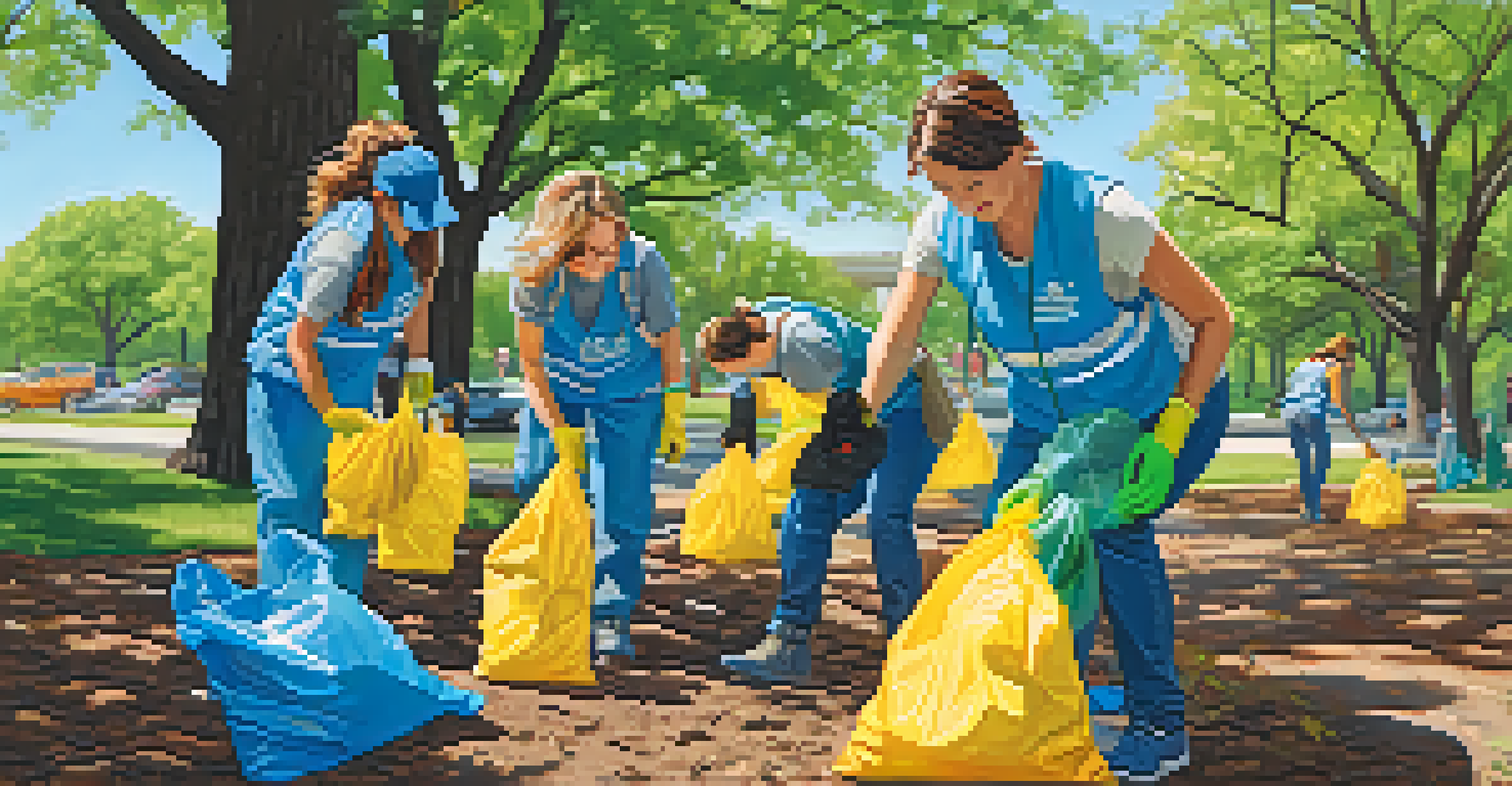The Impact of Local Charities on Austin's Environment

Local Charities: Champions of Environmental Change
In Austin, local charities play a vital role in environmental conservation. They work tirelessly to promote sustainability through various initiatives, fostering a culture of ecological awareness in the community. By partnering with residents and businesses, these organizations amplify their impact, transforming how the city interacts with its natural resources.
The environment is where we all meet; where we all have a mutual interest; it is the one thing all of us share.
One example is how charities like Keep Austin Beautiful mobilize volunteers for clean-up events, engaging citizens directly in the preservation of parks and waterways. These hands-on efforts not only beautify the environment but also instill a sense of pride and ownership among participants. When people see their contributions making a difference, they're more likely to continue supporting these causes.
The ripple effect of these charitable activities can be profound. As more individuals become involved, they often inspire friends and family to join in, creating a network of environmental advocates. This grassroots movement underscores the importance of local charities in advocating for a cleaner, greener Austin.
Promoting Sustainable Practices Through Education
Education is a cornerstone of many local charities' missions in Austin. Organizations focus on teaching sustainable practices, from composting to water conservation, ensuring that community members have the tools they need to reduce their environmental footprint. By hosting workshops and seminars, they empower residents to make informed decisions that benefit both their household and the planet.

For instance, the Austin Resource Recovery department collaborates with nonprofits to provide educational resources on waste reduction strategies. By showing residents how to recycle effectively and minimize waste, these programs foster a culture of sustainability. This knowledge is invaluable, as it helps create habits that contribute to a healthier environment.
Local Charities Drive Environmental Change
Austin's local charities engage the community in sustainability efforts, fostering a culture of ecological awareness and advocacy.
Moreover, these educational efforts often extend into schools, where local charities engage with students to instill eco-friendly values from a young age. By nurturing the next generation of environmental stewards, these charities ensure that the commitment to sustainability continues long into the future.
Community Gardens: Growing Together for a Greener Austin
Community gardens are a beautiful example of local charities making a tangible impact on Austin's environment. These gardens not only provide fresh produce but also foster community spirit and cooperation among residents. Local charities often spearhead these initiatives, bringing together diverse groups to cultivate shared plots of land.
We won't have a society if we destroy the environment.
In addition to supplying fresh food, community gardens contribute to urban biodiversity by providing habitats for various species. They help mitigate urban heat and improve air quality, making neighborhoods more livable. Plus, the act of gardening itself connects people to the land, reinforcing the importance of caring for our environment.
These gardens also serve as educational spaces where people can learn about organic farming and sustainable practices. Workshops on gardening techniques or composting often accompany these initiatives, further emphasizing the holistic approach local charities take towards environmental stewardship.
Advocacy for Environmental Policies and Regulations
Local charities in Austin are not just about hands-on projects; they’re also vital advocates for environmental policies. They work diligently to influence legislation that protects natural resources and promotes sustainability. By collaborating with local government and other organizations, they ensure that environmental concerns are prioritized in decision-making processes.
For example, charities often mobilize community members to participate in public hearings or advocacy campaigns, amplifying the voices of residents who care about environmental issues. This grassroots advocacy can lead to significant policy changes, such as the implementation of stricter pollution controls or increased funding for green spaces.
Education Empowers Sustainable Practices
Through workshops and resources, charities teach residents sustainable practices that help reduce their environmental footprint.
Furthermore, these organizations frequently provide valuable research and data to support their advocacy efforts. By presenting compelling evidence of the benefits of sustainable practices, they help shape a legislative landscape that prioritizes environmental health for all Austin residents.
Collaborating with Local Businesses for Greener Practices
Collaboration between local charities and businesses is another powerful way to enhance Austin's environmental landscape. Nonprofits often partner with companies to develop sustainable practices that reduce waste and promote eco-friendly products. This synergy not only benefits the environment but also enhances the businesses' reputations as responsible community members.
Take, for instance, the partnership between local coffee shops and charities focused on reducing plastic waste. By encouraging the use of reusable cups and offering discounts for those who bring their own, they create a win-win situation: customers save money while helping to decrease plastic pollution. These initiatives demonstrate how collaboration can lead to innovative solutions that benefit everyone.
Moreover, businesses that engage with local charities often find that their employees feel more connected to their work. Being part of community-oriented projects can boost morale and foster a sense of purpose among staff, which can lead to increased productivity and a positive work environment.
The Role of Volunteerism in Environmental Initiatives
Volunteerism is the lifeblood of many local charities focused on environmental initiatives in Austin. These organizations rely on the passion and dedication of volunteers to execute projects, from planting trees to organizing clean-up events. The sense of community that emerges from these efforts is palpable, as volunteers come together for a common cause.
Engaging in volunteer activities not only supports local charities but also enriches volunteers' lives. Participants often report feelings of fulfillment and connection with their community, which reinforces their commitment to environmental stewardship. By contributing their time, they become part of a larger movement aimed at creating a sustainable future.
Volunteerism Fuels Environmental Efforts
Volunteers play a crucial role in executing projects for local charities, enhancing community spirit and personal fulfillment while contributing to environmental goals.
Additionally, volunteering provides opportunities for individuals to gain new skills and knowledge related to environmental conservation. Whether it’s learning about native plant species or understanding waste management processes, these experiences empower volunteers to make a difference in their own lives and encourage others to follow suit.
Measuring the Impact of Charitable Efforts on the Environment
Understanding the impact of local charities on Austin's environment involves more than just anecdotal evidence; it's essential to measure tangible outcomes. Many charities track metrics such as the amount of waste diverted from landfills or the number of trees planted to assess their effectiveness. These statistics not only demonstrate success but also help refine future initiatives.
For instance, Keep Austin Beautiful often shares data on the number of pounds of litter collected during clean-up events. This information can inspire new volunteers and attract funding from sponsors who see the measurable impact of their donations. By showcasing these accomplishments, charities can galvanize the community to participate in ongoing efforts.

Moreover, sharing success stories and data reinforces the importance of continued support for local charities. When community members see the direct benefits of their involvement, whether through volunteering or donations, they are more likely to remain engaged and motivated to contribute to Austin's environmental health.